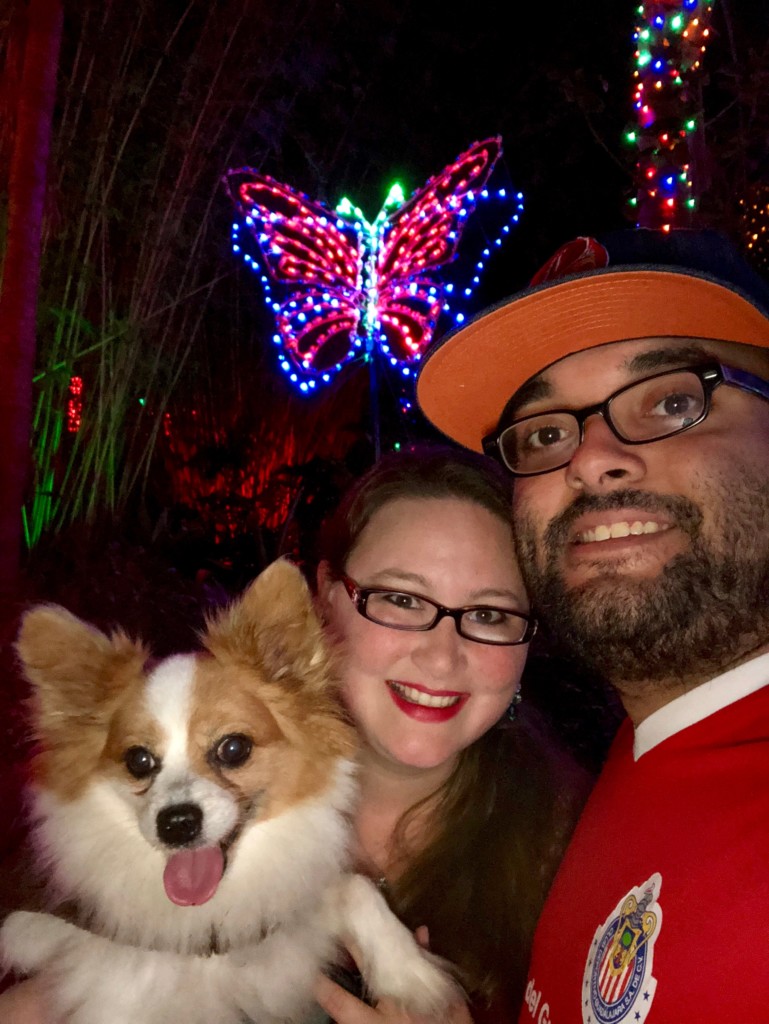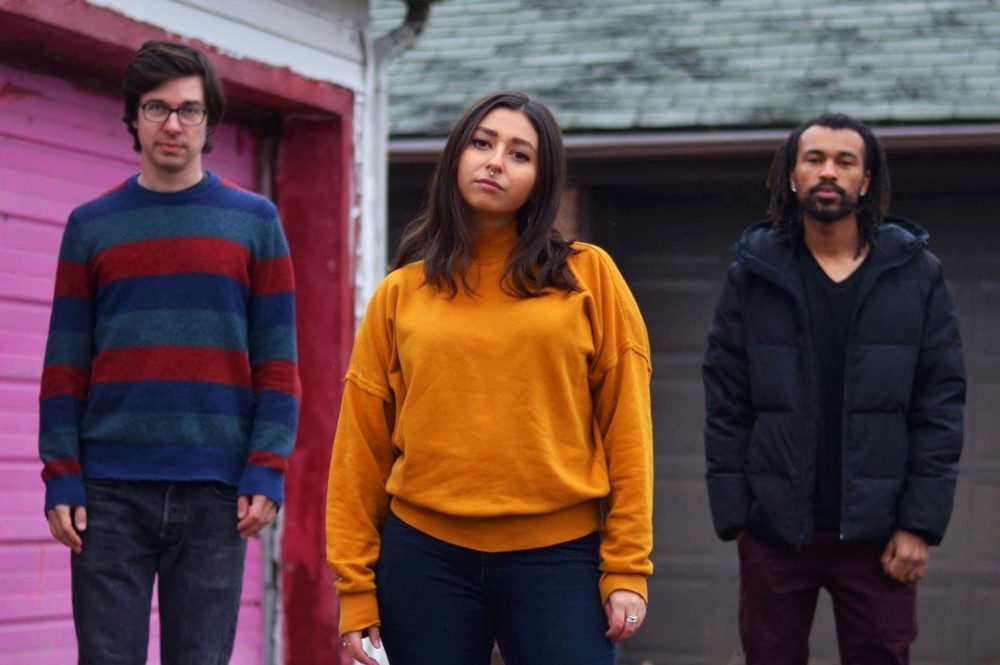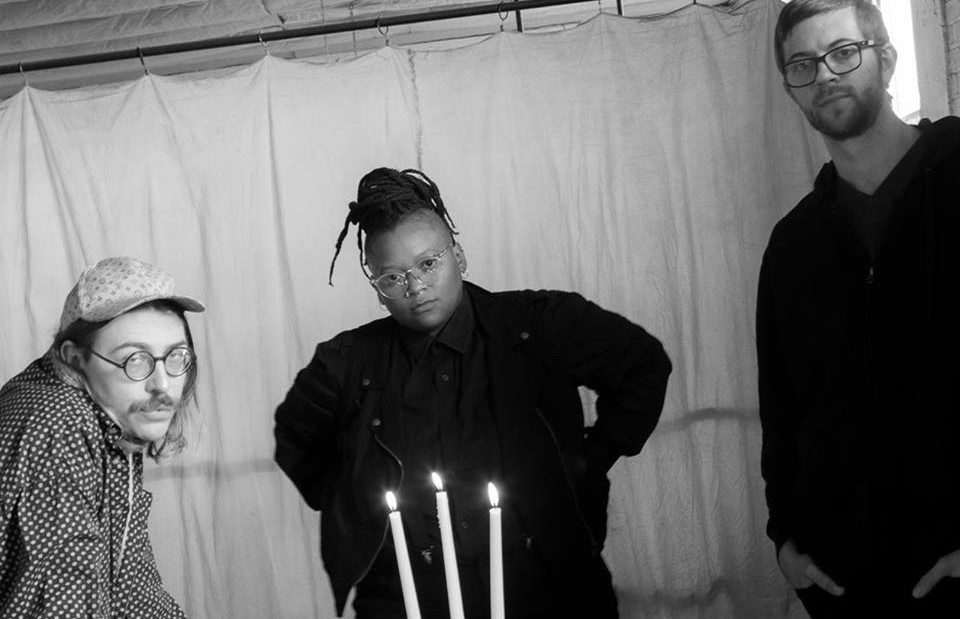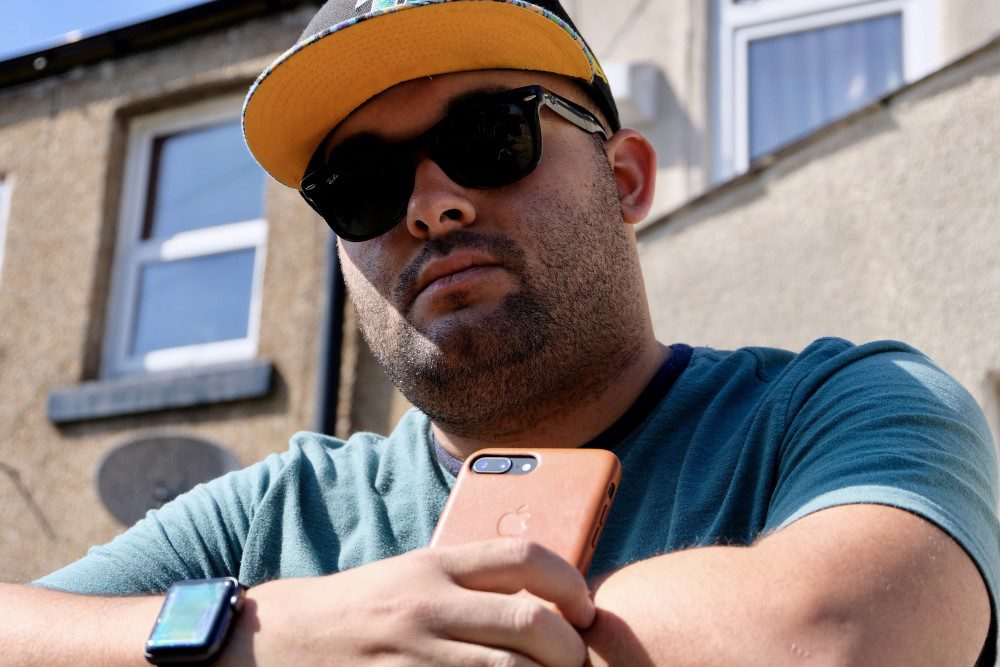
Randy Ojeda is the laid-back guy wearing glasses and a baseball cap at all the rock shows, whose warm presence is most acutely felt as he entices you to grab a beer with him even though you just met. He’s is an easy-going, music-loving people person through and through. But Randy is also a shrewd businessman. Along with his business partner and long-time friend Jason, Randy spearheads Cigar City Management – a music management company based out of Tampa, Florida – and works with acts from all over, including right here in Brooklyn. Randy’s business savvy paired with his gregarious nature also landed him a role recruiting artists for Symphonic, a digital music distribution company. However, Randy started his role in the music industry as a musician himself, picking up bass as a kid. Afterwards he went on to get a degree in – brace yourself – law. There is also another demanding role he fills daily, which is that of a Dog Dad for a little papillion named Mojo.
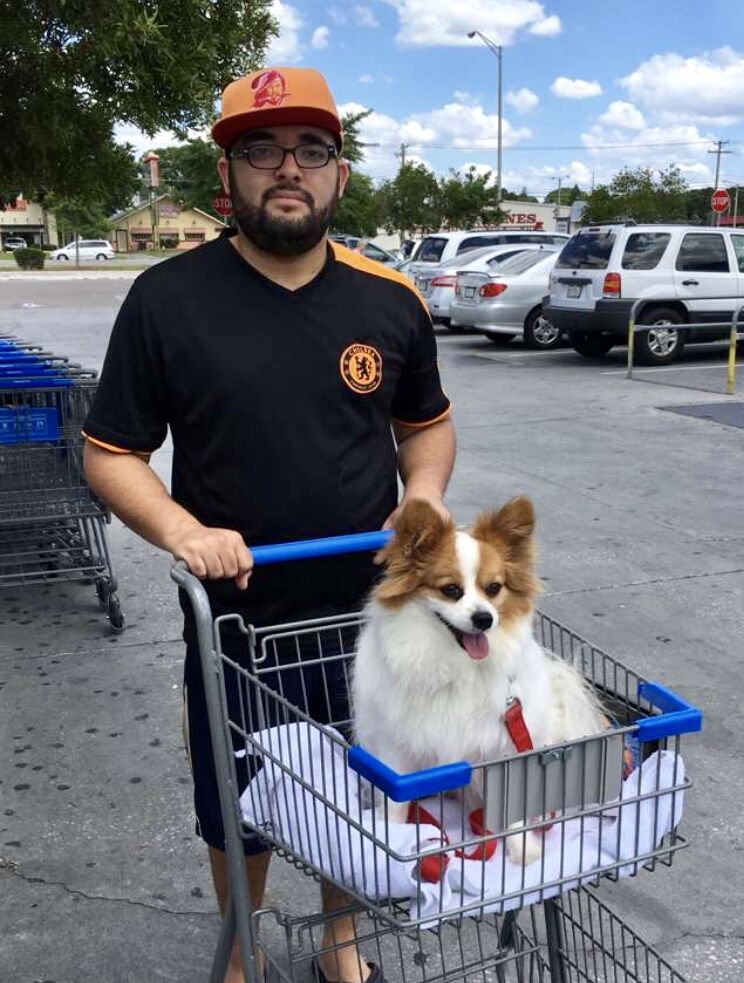
AF: Please introduce us to your pup.
RO: Meet my best friend, Mr. Mojo Risin. Mojo is an 11-year-old Papillon. He loves long walks, roughhousing, and tennis balls. He also has a bit of a foot fetish, as Sharkmuffin’s Tara Thiessen can attest to, but we don’t like to kinkshame him. He’s the perfect dog. I always say he’s got the heart of a large dog in the body of a small one. He’s a great cuddler, but he’s not just a lap dog. He loves to play, loves to be chased, and makes friends everywhere he goes. At the dog park they call him “the Mayor” because he runs up to the fence to greet every new dog that enters. He has his own Instagram.
AF: How did you find your Mojo?
RO: I got him from a breeder who had a litter of Papillons. I’ve always been obsessed with characters and creatures with big ears, like Dumbo. A neighbor had just gotten a Papillon (which means “butterfly” in French) and I thought a dog with those big, butterfly ears was the most adorable thing. I set out to find one of my own, and when I met this particular litter, there was one dog who wouldn’t leave me alone, who kept wanting to play and be near me. That was Mojo. We bonded right away. He’s been my little buddy ever since.
If I were to do it over again, though, I would definitely get a rescue pup. As great as Mojo’s breeder was (and of course I’m happy with the dog Mojo has become), there are so many amazing rescues and dogs who really need homes. I just wasn’t educated on the rescue system at the time, but now my cousin Amanda does a lot of work with rescues in Tampa, and she’s taught me a lot. If you want to get a Papillon, there are two great national rescues that I recommend: Papillon Haven and Pap 911 Rescue.

AF: Did you have previous pets?
RO: Growing up, we had an adorable teacup chihuahua named Candy. She was a pretty classic chihuahua, so she was very loving and protective with her family, but rather standoffish around everybody else. Most of my friends were scared of her. Have you ever seen a grown adult run from a 3-pound dog? I have and it’s hilarious.

We also had a cat named Fluffy, popularly known as Fluff Daddy. Fluff Daddy later changed their name to P Kitty, before eventually dropping the P and just going, simply, with Kitty. Fluffy was a few years older than Mojo and was pretty settled into our home when I first brought Mojo. Mojo, ever the socialite, was immediately drawn to Fluffy, who swatted at him right away. It set the tone for their relationship. Fluffy would often hunt Mojo for the fun of it, never hurting him but just being a cat. Fluffy also never used a litter box! Instead they went to the bathroom outside like a dog. The world was Fluffy’s litter box! Fluffy would have been right at home in New York, where anywhere can be a bathroom if you’re really determined.
AF: When did you start playing music?
RO: My dad gave me a box of his old vinyl records when I was in middle school. Typical “dad rock” – The Beatles, Stones, Pink Floyd, Led Zeppelin, etc. I thought it was cool that some of the Zeppelin records were numbered, like comic books, so that’s where I started. By the time I got to “Dazed and Confused” I was hooked. At the same time, we had just gotten broadband internet, replacing our dial-up connection (just saying that makes me feel so old), so I got really into downloading music. I became obsessed with finding new bands, learning about new genres, and just discovering as much music as possible. Playing music just became the natural evolution of that obsession.
AF: Why did you choose the bass as your first instrument?
RO: I started with bass and a little guitar, mostly because sick basslines were my favorite part of any song. But also, I really wanted to be in a band, and I had friends who were already really good at the other instruments – nobody else wanted to play bass, though, so I was just trying to fill what was needed.
AF: What was the name of your first band and how did it come about?
RO: My first band was called Car Full of Midgets, named after a really obscure reference from the short-lived Clerks animated series. I’m not sure if that name would be allowed today. We formed because we really wanted to play in the middle school talent show so we learned “Back in Black” by AC/DC. I did the Brian Johnson part, so I was on vocals and became the de facto front man. After the talent show, we kept playing together and learned more songs that we liked, while attempting to write our own songs. Eventually we decided to try and book a gig. We literally looked up music venues in the phone book (remember those?) and called each one. Whoever actually answered didn’t take a couple kids seriously at all, so we asked my dad to call back the venues that did answer. I guess he became the band’s manager. He talked a local dive bar, The Brass Mug, into letting us play a short set during an Open Mic Night. We weren’t old enough to get into the bar, but they let us load right onto the stage, play three or four songs, and load immediately back out. It was a Monday night, so my dad had to convince all the other parents to let us stay out on a school night, and we all had to promise we would get our homework done before our set. It was basically just my dad and a few regular, very drunk bar patrons, but it meant everything to us.
AF: When did you decide to switch from playing music to the business side of the industry?
RO: I kept playing in bands throughout high school and into college, but kind of called it quits when I decided to go to law school. I honestly thought I was done with music – I wanted to work in the tech industry, and went from reading Pitchfork to reading Fast Company, for example. But I went to law school in Chicago, at the same time that Chicago was having this musical renaissance. Chance the Rapper had just dropped his first mixtape, and I was really tuned into the hip hop scene there at the time. So I got pulled back in. I started working with hip hop artists and producers, just trying to help and gain experience. Through my school’s network, I connected with some entertainment lawyers, and thought maybe that was the path for me, but I didn’t really vibe with the role that a lawyer plays in an artist’s career. The industry has changed a lot recently, and now managers do so much – a manager is really critical in developing an artist. You’re not just involved in the business or negotiating a deal, like a lawyer is, but you’re involved in creative decisions, branding, and all the day-to-day stuff that really makes this business exciting and rewarding. It leaves a lot of room for creativity and sometimes you have to throw out the rule book. I love that.
AF: Tell us about the history of Cigar City Management, and how the company came to be.
RO: I was working in hip hop for a bit, and although I loved the music, hip hop has a lot of misogyny, violence, and a bad drug culture that at times left me feeling ashamed of the type of work I was doing. I needed something that was more me, something I could be proud of, and I really wanted to put a spotlight on artists who were doing something unique. I wanted to support diverse voices – women and non-binary musicians, people of color, immigrants, members of marginalized groups, etc., and I wanted to find artists who believed in the type of causes that I believe in. There are so many awful people in the music industry, so my mission was to find people who are good, who genuinely care about more than just sex, drugs, and rock & roll. That is essentially the mission statement of Cigar City Management: Music Should Be Good. I formed the company with my business partner, Jason. He’s our CFO and does all the math. I don’t math. He’ll deflect all the credit, but I really couldn’t do this without him. I like connecting with people and making things happen, but I hate dealing with the financial part of the business, and it’s just not how my brain works. So, in many ways, Jason helps me keep the lights on. Because we work with a lot of emerging bands, the margins are very important. You have to keep track of every dollar and where money is coming and going, or else you’ll never actually make money. The bands that survive are the ones who understand that and take it seriously. If you want music to be your business, you have to treat it like a business. If you don’t keep an eye on it, it’s funny how easily money disappears.

AF: How did you become friends with your partner, Jason?
RO: We met in high school. We both attended an all boys’ Catholic school and most of the people we went to school with were exactly the type of person you’d expect to go to an expensive private school. Some of us had started forming our own little clique of weirdos and loners, the people who didn’t fit the mold. We’d hang out during free periods and lunch, and our mutual friend Matt Roberts, who I was in a band with at the time, started bringing his guitar to school so we could write and jam. One day Jason picked up the guitar, and effortlessly played some Stevie Ray Vaughn licks. I had no idea he even played guitar, but I knew right away that he was definitely the best guitarist at our school. Matt and I asked him to join our band, and for a couple years we seriously underutilized Jason’s talent – we were this scrappy metal band and wanted Jason to play chugga-chugga riffs, but he was a bluesman at heart. After the metal band broke up, Jason and I continued to play and write together and over time he became my best friend (besides Mojo, of course). I don’t know anybody who does more for their friends and the people he cares about than Jason. He’s the guy who will drop everything to help you move, help solve a problem, or just be there when you need it. He was the best man in my wedding, and I wouldn’t want to be in this business with anybody else.
AF: Who are some of the bands you are currently working with?
RO: We have a pretty excellent roster – Big Bliss, A Deer A Horse, Fruit & Flowers, Jackson Boone, Kino Kimino, Parrot Dream, Pecas, The Fantastic Plastics, and this one band called Sharkmuffin. Have you heard of them?
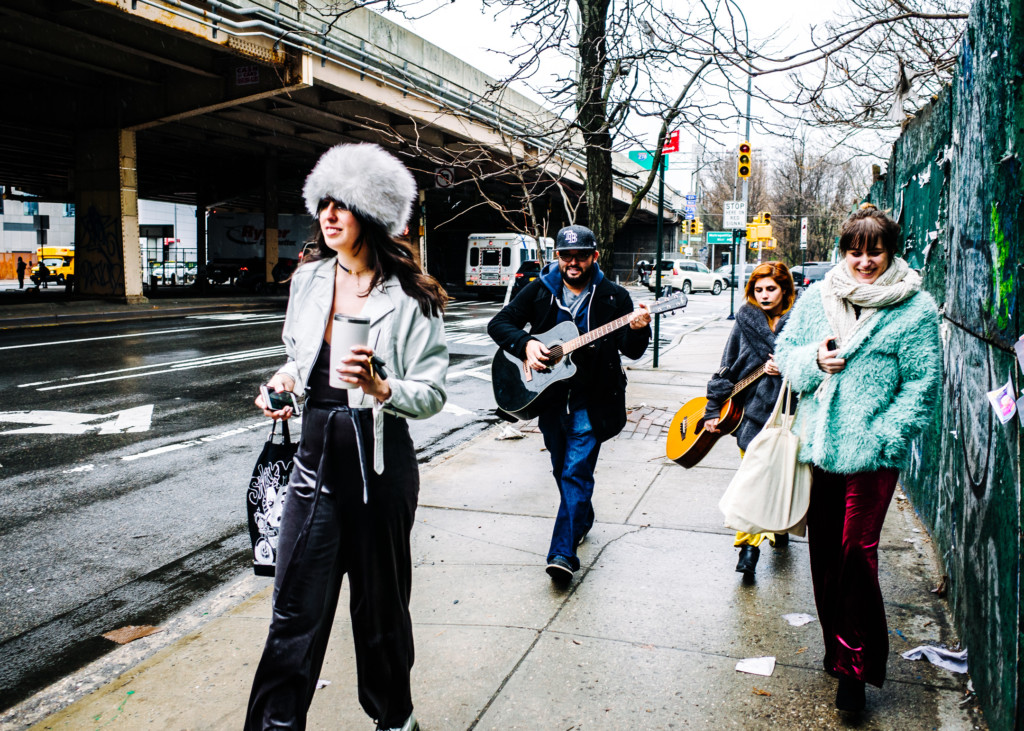
We also just added two really cool bands – Ganser, from Chicago, and Fever Beam, which is the first band from my hometown that I’ve managed. I’ve got links to everybody and to our Spotify Playlist on our website.
AF: Any shows or other events coming up with your roster?
RO: There are always a ton of great shows coming up. Big Bliss is playing the Grim Streaker album release show on May 16th at Alphaville. Fruit & Flowers is playing with City of the Sun at Webster Hall on June 15th. On June 28th, Ganser is playing the Flipper 40th Anniversary Show at Reggie’s in Chicago. Fever Beam is going to be on tour in April and A Deer A Horse is hitting the road again this summer. Also, both Parrot Dream and Sharkmuffin are playing Waking Windows Festival in Vermont on Saturday, May 4th. And you can catch The Fantastic Plastics every Wednesday night at 9pm Eastern on their very own Twitch Channel, which is totally the most futuristic way to tour.
AF: Tell us about your role in Symphonic.
RO: I do Artist & Label Outreach for Symphonic. It’s an invite only platform, so I seek out artists and labels that I think would be a good fit for the services Symphonic provides and I connect them with the rest of the team. So far, I’ve brought in some really cool artists and labels. It’s a great gig – they certainly take care of me, give me plenty of autonomy, and it’s perfect for me because I can bounce between the Tampa and Brooklyn offices.
AF: Are there any new Symphonic events or products we should check out?
RO: Expect to see Symphonic NYC continue to grow. There are some events planned throughout the year in New York, but nothing that I can mention right now. I can say that the New York Office hosts charcuterie Fridays for artists, so hit me up if you want an invite for free cheese.
AF: What is your spirit animal?
RO: My spirit animal, specifically, is Kermit the Frog. He’s pretty responsible but surrounds himself with a bunch of troublemakers. He’s constantly trying to wrangle everything together and hone the team in, because he knows there’s genius there, but yet he remains calm when all hell inevitably breaks loose. That’s pretty much me. I think Kermit could probably drop the Muppets altogether and get a real job – I’m sure he’d be an asset to any company. But how could he live without the Muppets? Could you imagine Kermit with a 401k?
AF: If Mojo was a musician, what instrument would he play and what genre of music would he write?
RO: I’ve actually thought about this fairly often over the years. He’s named after Jim Morrison, so you’d expect him to be a psychedelic crooner; however, I think Mojo is actually more into early electronic music, so he’d probably start like a synth pop or krautrock group. Maybe he’d be on vocals or synth. When I first got Mojo, I was listening to a lot of Kraftwerk and some of their cuts, like “Computer Love” in particular, would typically calm him and lull Mojo to sleep. So, I think he’d be on that wave. I think his project would have a strong visual aesthetic; however, for such a cute dog, he’s very weary of photos, though. So, he wouldn’t tour very much and would only give the occasional rare interview. He’d be like the Burial of dog-fronted bands.
When I first got Mojo, I was listening to a lot of Kraftwerk and some of their cuts, like “Computer Love” in particular, would typically calm him and lull Mojo to sleep. So, I think he’d be on that wave. I think his project would have a strong visual aesthetic; however, for such a cute dog, he’s very weary of photos, though. So, he wouldn’t tour very much and would only give the occasional rare interview. He’d be like the Burial of dog-fronted bands.
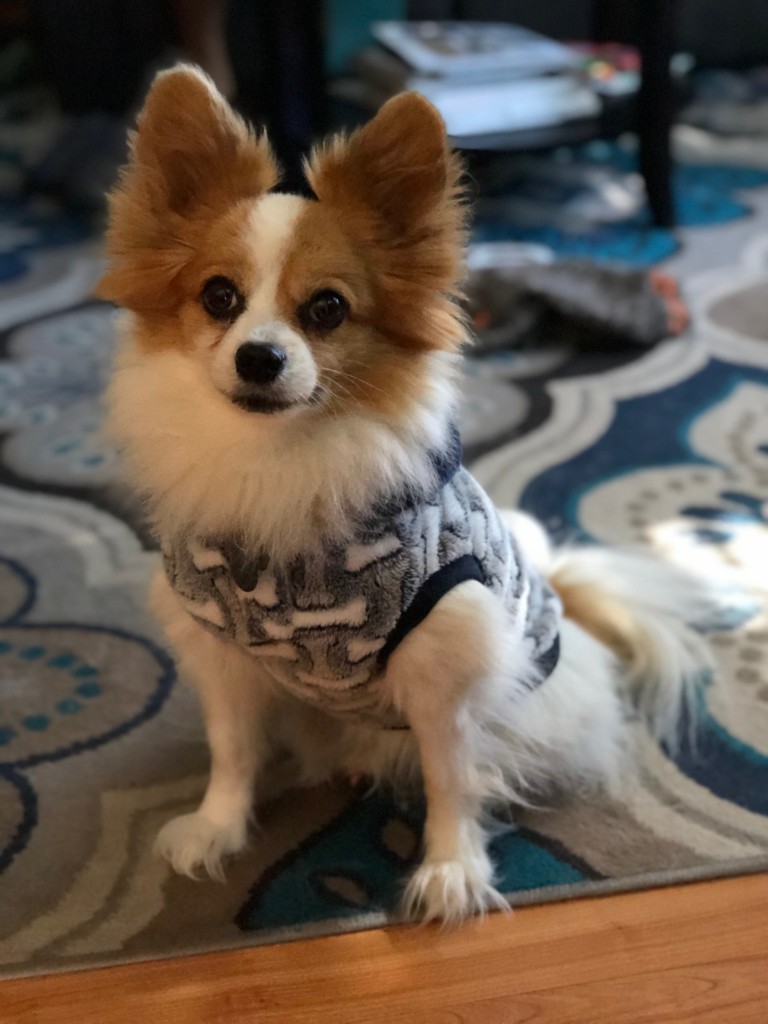
AF: Does Mojo have a favorite food?
RO: Mojo has never met a food that he doesn’t like. He actually goes really crazy for ice, though. Straight ice, right from the ice maker. We live in Florida and Mojo has quite a lot of fur, so on hot days I give him an ice cube after our walk and he loves it. It’s definitely a low-cost dog treat, and it cools him down. If he even hears the sound of ice, he’ll come running. We give him a lot of fruit, too. On special days we’ll take him to Twistee Treat, where they serve a Pup Cup ice cream. He eats it so fast.
AF: How does Mojo inspire you in your career day-to-day?
RO: We have a screened-in patio, which can be essential in Florida. Mojo likes to hang out there and “chase” lizards, but the only problem, for him, is that most of the time these lizards are on the outside of the screen. So, he never actually catches these lizards because it’s basically impossible. Yet every day he goes out to the patio and tries his hardest to catch a lizard. One day, an unsuspecting lizard somehow made its way to Mojo’s side of the screen and Mojo captured the lizard in his mouth. He brought it right up to me, so I could see what he had accomplished. He didn’t hurt the lizard, he immediately dropped it and let it run away, but I could tell he was proud of himself. He did it. Being successful is all about finding the perfect mix of timing, perseverance, and luck. Mojo knows to never give up.
Yet every day he goes out to the patio and tries his hardest to catch a lizard. One day, an unsuspecting lizard somehow made its way to Mojo’s side of the screen and Mojo captured the lizard in his mouth. He brought it right up to me, so I could see what he had accomplished. He didn’t hurt the lizard, he immediately dropped it and let it run away, but I could tell he was proud of himself. He did it. Being successful is all about finding the perfect mix of timing, perseverance, and luck. Mojo knows to never give up.
AF: How was your SXSW?
RO: This was definitely the best SXSW I’ve been to, from a professional standpoint. I think all of our artists really stepped up. I sit behind my computer all day, so sometimes it can be hard to objectively see how well we’re doing, but at SXSW you can very visibly see the growth. In many ways, it’s a stress test for artists. Everything about being in the industry, being in a band, is exacerbated – so you can figure out in one crazy week whether you have the stomach for this business or not. I’ve seen bands both rise and fall at SXSW. This year was pretty smooth: no meltdowns, no mediations, no interventions. Just a lot of great music and some incredible nights. Knock on wood for next year.
AF: What do you miss most about Mojo when you are on tour?
RO: My wife and I don’t have kids yet, so Mojo is pretty much our baby at the moment and the three of us make up our nuclear family. There’s something about just being all together – having my wife, Liz, next to me in our bed, with Mojo laying by our feet. It makes me feel all warm and fuzzy and reminds me that the love we have is worth more than any concert or music video. Don’t get me wrong, I’m really grateful for getting to do the work that I do and I’m thankful that because of music I’ve been able to see so much and do a lot of really, really cool things. But I’m not at home unless I’m with my family – and along with my amazing wife, Mojo is a very big part of my family. When we’re together everything feels right.
